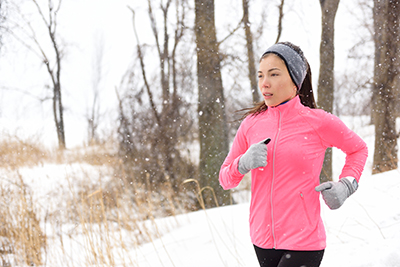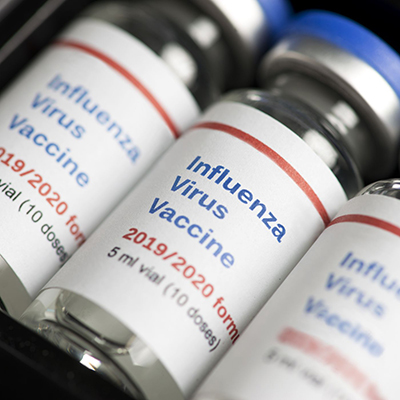Winter Wellness Myths
Separating Fact From Fiction
By Melanie Carden
Winter wellness. It’s more than embracing your great-grandmother’s fervent wisdom. In the age of information-access and self-advocacy, you are empowered to elevate your wintertime well-being.
Staying active is always a priority—even when there’s a chill in the air. But you also want to avoid the colds and flu the season is notorious for and enjoy the delights—snowy nights, cozy frocks, and warming cocktails. But are those cocktails actually “warming” you up? There is an endless list of winter-isms we often swear by—but which are myth versus scientific certainties?

COLD AIR MAKES YOU SICK
We all know the scene in the movie A Christmas Story. The mom bundles up the little boy in an absurd ensemble of anti-shiver attire—so thick the poor kid can’t bend his scrawny, bird-like arms. Though it’s certainly important to stay warm, cold air—on its own—does not make you sick. In fact, the cells that fend off infection are more active in cold weather, according to Dr. Rachel C. Vreeman, co-author of several health-myths themed books.
Many in the medical community suggest the cause of those pesky winter colds is not the frosty air itself but the reduced humidity, which compromises the mucus membranes. Other scientists propose an even simpler explanation: we’re indoors more and in closer proximity to one another, which hastens the virus’s spread. So, bundle up, get outside for your winter walks to boost those infection-fighting cells, and…wash your hands often.

BODY HEAT IS LOST THROUGH YOUR HEAD
An old wives’ tale? Nope, we can credit a 1950 military study for this evergreen advice. The accuracy of these findings has since been called into question. The study sent volunteers to the Arctic—dressed in top-of-the-line survival gear…everything except for hats. No hats, folks. The heat had nowhere to go—but up and out.
Similarly, if you head outside in frigid winter conditions dressed head to toe in warm clothes—except gloves—well, you’ll lose most of your body heat through your hands. A poorly designed study that has become the cold weather rally cry of our loving mothers and grandmas is not without merit, though.
We don’t need a military smarty-pants or a chicken soup-making matriarch to embrace common sense: if you want to be warm this winter—dress appropriately.

YOU CAN GET THE FLU
FROM THE VACCINE
Among the winter myths, this one is the easiest to debunk. The Centers for Disease Control and Prevention (CDC) are quite clear: you cannot get the flu from the flu vaccine. According to the CDC, some people may experience common side effects from flu shots, including soreness, redness, tenderness, or swelling where the shot was given; some may suffer a low-grade fever, headache, and muscle aches. Because these side effects overlap with flu symptoms, people sometimes interpret these reactions as actual influenza. It’s imperative to remember, though, according to the CDC, that the flu is a serious health risk. Though mild reactions occur from time to time, it’s important to get the vaccine each year because flu viruses are constantly changing, so the vaccine composition is updated. Kickstart your winter wellness with the flu vaccine and protect yourself from the unforeseen!
Many in the medical community suggest the cause of those pesky winter colds is not the frosty air itself but the reduced humidity, which compromises the mucus membranes. Other scientists propose an even simpler explanation: we’re indoors more and in closer proximity to one another, which hastens the virus’s spread. So, bundle up, get outside for your winter walks to boost those infection-fighting cells, and…wash your hands often.

LESS SUNSHINE CAUSES
WINTER DEPRESSION
Seasonal Affective Disorder (SAD) is a form of depression that has been in the spotlight the last few years—deservedly so. According to Harvard University, “Experts don’t fully understand the cause of SAD, but leading theories place the blame on an out-of-sync body clock or improper levels of either the hormone melatonin or the neurotransmitter serotonin.” The disorder rears its ugly head in autumn or winter—when the daylight hours dwindle. The good news is that SAD impacts only about 1 to 2 percent of the population, and so if you’re feeling a bit in a funk, it could be due to other seasonal challenges.
Ask yourself if you’ve been active enough, are you stressed about the cost of holiday shopping, or exhausted from festive obligations? Diet can also play a role—cheesy casseroles and heavy comfort foods can leave us feeling lethargic. And those warming winter cocktails? Well, a measure of moderation may help to keep the winter woes at arm’s length. But if you’re feeling blue and wonder if you are experiencing SAD—chat with your doctor. The mainstay of SAD treatment, as outlined by Harvard, is light therapy, also called phototherapy, which can be readily incorporated into your winter routine!

VITAMIN C PREVENTS COLDS
We end on a myth that is still largely debated! In the early 1960s, Noble Prize Winner Linus Pauling, a chemist, began touting the immune benefits of large doses of vitamin C. The idea took off like wildfire (again, we love you, mom! We love you granny!), but megadoses have since come into question. Dr. Marvin Lipman (Endocrinologist and Consumers Union’s Chief Medical Advisor) asserts that there’s very little evidence available showing that vitamin C in megadoses is beneficial. In fact, he and famed professor and cookbook author Dr. Andrew Weil agree with more recent research that indicates tissues of the human body “can’t use more than 200 milligrams a day.” It is generally suggested that RDA (recommended dietary allowance) be set to 75 milligrams for women and 90 milligrams for men. Both Lipman and Weil agree we could benefit from an increase to 200 milligrams each day—but this is a far cry from the 1,000+ milligram megadoses we often read about to prevent or “cure” a cold or flu. So, is vitamin C crucial to your immune and overall health? Absolutely. But the idea of megadosing has come under scrutiny.
But guess what? If you want to take a high-dose vitamin C supplement when you feel a cold coming on, you’re not alone. Dr. Weil says he does it too! In the end, when you feel the sniffles and want to “C” your way clear of a cold—take Weil’s advice and do what works best for you!





